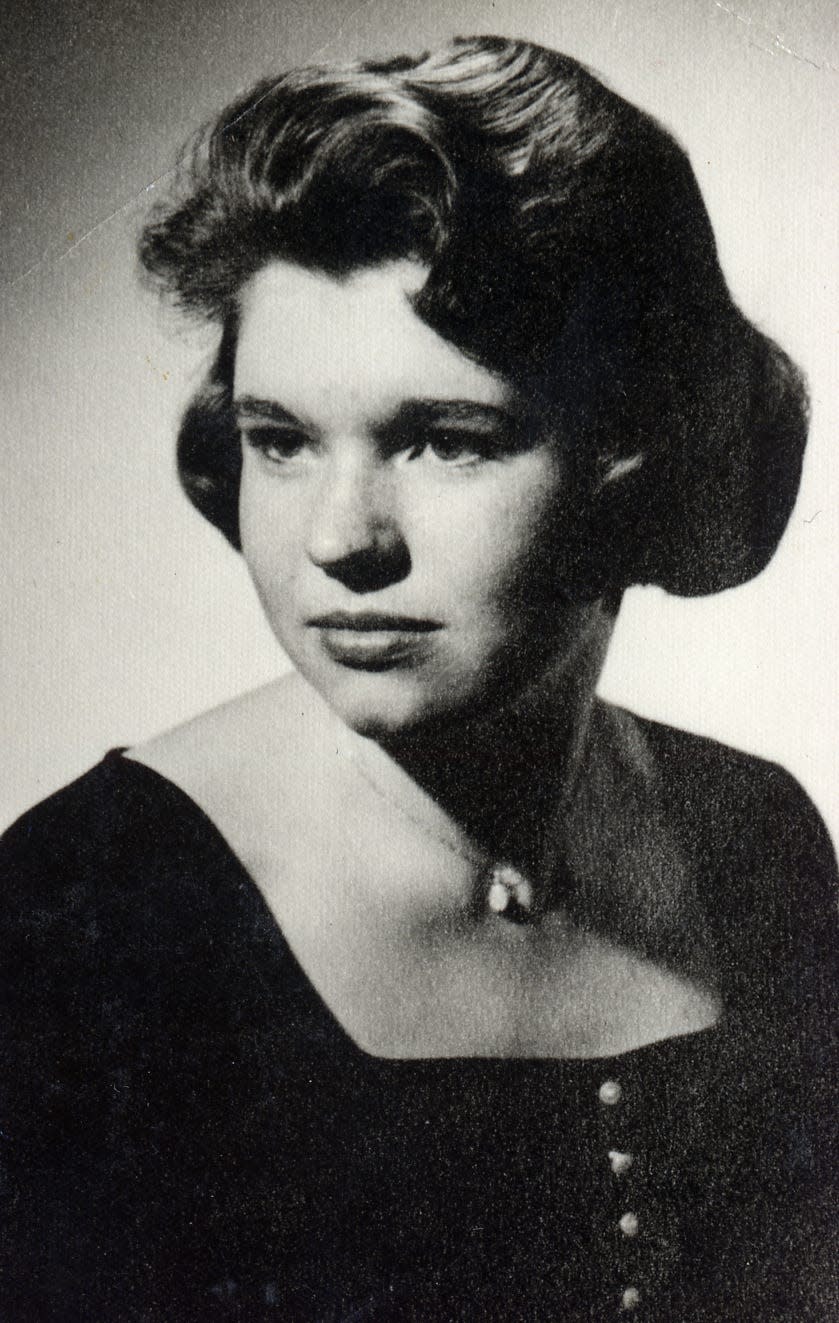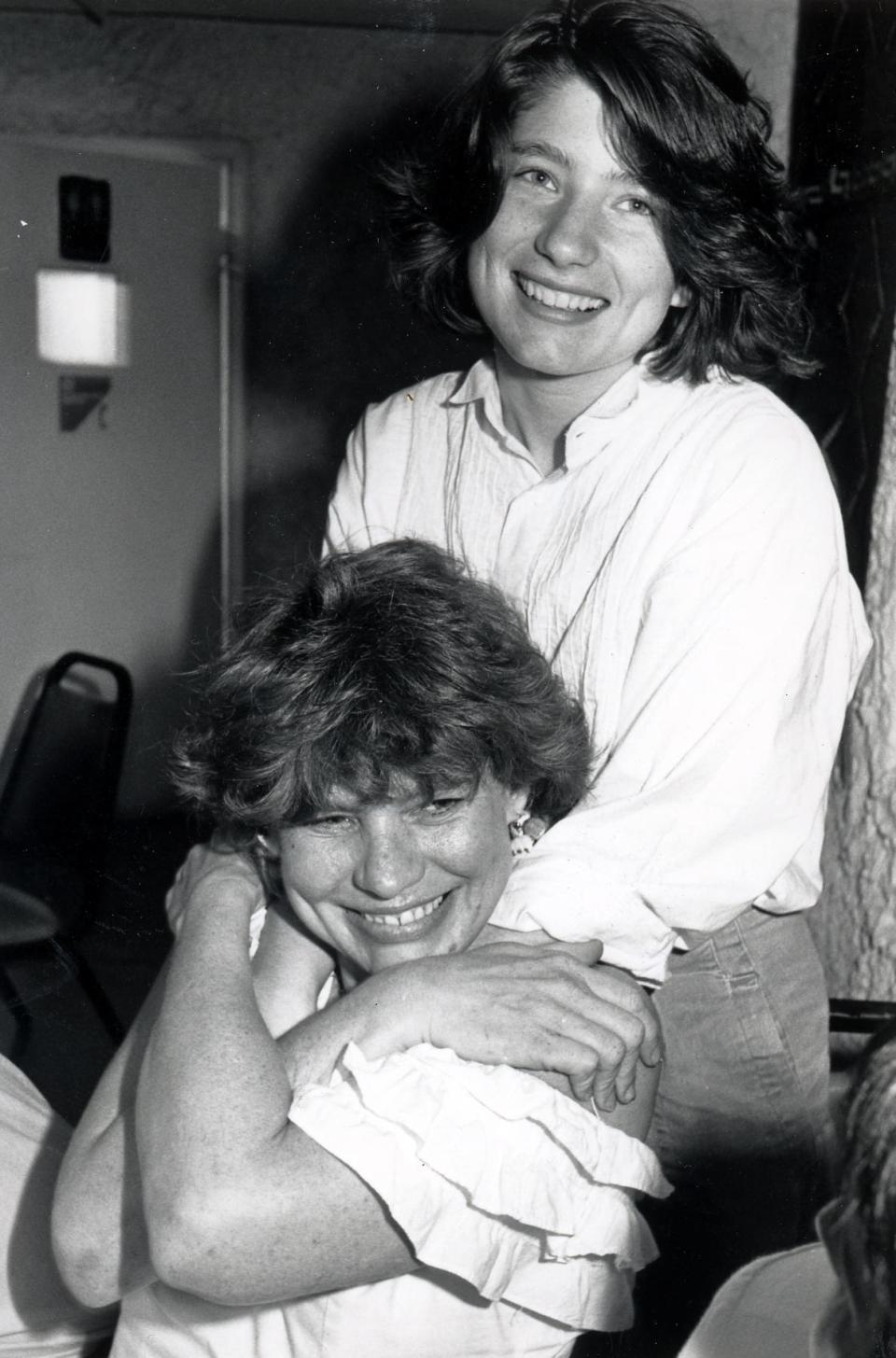Jo Carol Pierce, 'one of Texas' best storytellers of all time,' dies at 78
- Oops!Something went wrong.Please try again later.
- Oops!Something went wrong.Please try again later.
- Oops!Something went wrong.Please try again later.
Songwriter, playwright, performer and social worker Jo Carol Pierce, who brought her distinct brand of creative quirkiness from her hometown of Lubbock to her adopted home of Austin, died of cancer on Dec. 2 in Houston. She was 78.
Pierce hit her stride in the late 1980s with a semi-autobiographical series of songs and stories provocatively titled "Bad Girls Upset by the Truth." It grew from a cabaret act into a stage play and two celebrated albums during the the 1990s.
"As far as I'm concerned, one of Texas' best storytellers of all time," performer, songwriter and playwright Sterling Price-McKinney wrote about Pierce on the day of her death. "She tells local life like it really is, the human desires and needs, juxtaposed against religious contradictions and judgment. Her stories describe the way I grew up in the late 20th century."
During the 1980s and '90s, Pierce was a key piece of the creative fabric in Austin, much of it woven by artists with ongoing ties to West Texas. Included in that club were artist and musician Terry Allen; playwrights and actors Joe Sears and Jaston Williams of the "Greater Tuna" series; the theatrical collaborative Big State Productions and its signature show, "In the West"; and, of course, musicians Jimmie Dale Gilmore, Joe Ely and Butch Hancock, who formed the Flatlanders in 1972 in Lubbock, went on to solo careers and then revived the original band several times. Pierce and Gilmore were married briefly in the 1960s.
Much of this collective artistic achievement revolved around respecting the state's sense of place and heritage while escaping its narrow strictures.
Pierce's life exemplified that freedom. As musician and filmmaker Troy Campbell told the American-Statesman in 2008: "She's like Tom Waits meets Loretta Lynn on a cross-country acid trip."

Escape from West Texas
Pierce was born July 24, 1944, in Wellington, about 160 miles northeast of Lubbock. She moved with her mother and siblings to that Panhandle city after her father died in the Korean War.
Like her free-thinking younger sister, Cynthia, she couldn't wait to get out.
"Growing up in Lubbock was like being in prison or something," Pierce told journalist Stayton Bonner for a 2008 profile of her for the American-Statesman. "I understand they passed a leash law for cats. I really want to see how that's working out. I felt like I was a cat in a town with a leash law."
More:John Aielli, longtime voice of Austin mornings on KUT and KUTX, has died
She found a temporary escape in radio during the 1950s.
"That was the first time I ever heard Howlin' Wolf and Muddy Waters, and I just went nuts," she told Bonner. "You could only get it in the middle of the night. That's when the mighty signals went out. It was around fifth grade. You'd be amazingly willing to go to bed on time and then turn on the radio and hold your ear against it all night long. It stole into your bedroom at night from this windy and sandstorming place where there was nothing as far as you can see."
In Lubbock, she attended high school with Gilmore, Ely and Hancock. As a youth, she performed in plays and competed in talent contests.
She married sweetheart Gilmore in 1963. They had one child, Elyse Gilmore Yates, before they divorced in 1967. Her second marriage lasted for only three weeks. By 2000, she had three ex-husbands.
"Most of us have been married lots of times, so we have lots of wife-in-laws," Pierce said about her Lubbock friends from childhood. "Those are permanent relationships, unlike other contractual relationships. Jimmie Gilmore's wife, Janet, is one of my favorite wife-in-laws. A wife-in-law means you have both been married to the same person. Usually not at the same time."
In 1967, swept up in the Summer of Love, Pierce left Lubbock for Berkeley, California, in a Volkswagen van with her young daughter. She then moved to Austin in 1972.
In Austin, Pierce worked for Child Protective Services. Underpaid and overworked, she devoted as many as 80 hours a week to helping neglected and abused children.
At the same time, Pierce felt that the men in her life had the luxury of creative time and energy, something she sorely wanted by the time she turned 40.

Part of an Austin revolution
It was not until Ely and David Halley encouraged her to write songs in the 1980s that she found her métier. She started dreaming up the "Bad Girls" song cycle in 1984.
Meanwhile, Pierce worked with other collaborative artists at Big State Productions to write and perform "In the West," a theatrical response to photographer Richard Avedon's exhibition and book "In the American West," which was seen as a reductive look at working-class westerners.
More:Guero's Taco Bar founder Rob Lippincott, who helped transform South Congress, has died
The series of monologues, staged with utmost simplicity, opened in 1985 and took off like a rocket. It wasn't clear at the time, but Big State's success pointed the way to an outburst of Austin alternative theater in the 1990s.
"This was our experimental theater company," wrote Austin Chronicle arts editor Robert Faires, looking back in 2006, "the most daring, the most innovative theatrically, with a corps of talented young artists willing to take risks."
Pierce was one of those artists.
Introducing 'Bad Girls' and other characters
Staged with friend and musician Robert Jacks at Chicago House, a downtown coffee bar, Pierce's next hit show was all her own. Trying to work out her eccentric life's secrets in songs and stories, she wrote about sleeping with 157 “perfect boys” to find Jesus.
According to Bonner's profile, musician and filmmaker Campbell caught Pierce's act at Chicago House in 1988.
"She was working on her play," he told Bonner. "I'd heard she was really funny. There were about three people watching while she did her performance. It was really awkward and beautiful. I was moved to tears by the end of it."
Campbell asked if he could buy a CD. Pierce didn't have one. She went home and recorded songs on a tape machine.
"In between them, she talked to me," Campbell said. "She said, 'This one's a girl song but it could be sung by a boy. Maybe that's what you want to do.' I played that tape for everybody I knew. It was great."
More:Austin indie bookstore Malvern Books, a hub for writers, to close
On July 13, 1989, "Bad Girls" was featured in my inaugural column for this newspaper.
"I was innocently writing an outline for 'Bad Girls' in 1984," Pierce told me, "when Jesus showed up as a character, smiling enigmatically. It was upsetting. It still is."
In the show, Pierce sat at a table surrounded by votive candles that she referred to as her altar. It was crowded with personal portraits, decorative hearts and statues and images of Mary and Jesus. The macabre setting fit the mood of Pierce's somewhat autobiographical tales about a younger woman named Jo Carol.
Pierce, dressed in cowgirl boots and shiny net petticoats, delivered her part with a knowing, husky voice.
"Bad Girls" was unlike anything else, before or since. Pierce revived the show several times.
By the 1990s, it seemed as though Pierce was everywhere on the Austin creative scene.
In 1992, she revived her brand of High Plains surrealism in "Little Miss Loulou," a comedy built around a hilarious kidnapping caper, produced at Southwestern University in Georgetown.
The same year, Statesman music writer Don McLeese chose her compilation "Across the Great Divide: The Songs of Jo Carol Pierce," sung by other artists and friends, as one of top 10 Austin albums of the year. It could be described as "Bad Girls" without the majority of the spoken text.
"This collection underscores the common bonds within Austin's musical diversity," McLeese wrote, "through the communal celebration of a songwriter who is special even by Austin standards."
"Across the Divide" won record of the year and producers of the year at the Austin Music Awards.
In 1994, she performed in Jo Harvey Allen and Terry Allen’s "Chippy," a musical developed at the University of Texas and commissioned by the American Music Theater Festival in Philadelphia. The show was set in West Texas during the 1930s; the album, also known as "Songs from Chippy," turned into a cult favorite. On it, Pierce sang two of her best songs, "Across the Great Divide" and "I Blame God."
In 1995, Pierce recorded her own album version of "Bad Girls." It was the talk of the following South by Southwest festival.
"She wasn't the greatest singer at the time, but her attitude was, 'Who cares?'" Campbell told Bonner. "It was about the poetry. There wasn't any fluff on 'Bad Girls.' It all hits pretty hard and holds up real well."
After 'Bad Girls,' more life
Pierce continued to work for CPS, which contributed to the darkness of some of her work.
"I want it to unsettle people, and I also want it to be really funny," she told Bonner. "I never forget the kids that I work with. You're dealing with people when they're in their most raw and revealing. There's a job that needs to be done in a certain way for a real good reason. That keeps me going. And it's a lot less scary than writing or playing."
More:Daniel Sahad, rising Austin music star and lead singer of band Nané, has died at 29
Pierce also wrote plays, screenplays and a novel.
A happy marriage to her fourth husband — musician and graphic artist Guy Juke, originally from San Angelo — slowed down her creative output.
"I got married to Guy Juke, and after that I didn't write for 12 years," Pierce told Bonner. "Which made him feel horrible. People would rag him about it. 'What are you doing to Jo Carol's writing? What's wrong?' Being happily married does interfere with my songwriting quite a lot."
It was not until 2008 that she completed her second album, "Dog of Love," described as "poignant" but also "more mellow, loving and simplistic" than "Bad Girls."
In 2013, Pierce returned to the big stage in "Is There Life After Lubbock?" In the show, Jaston Williams hosted an evening of poetry, stories and songs that featured Pierce and Ely.
She lost her sister, Cynthia Pierce, considered the family's brainy sibling, when she died in an Austin assisted-living home after it lost power during the catastrophic winter storm of 2021. She was 72.
Before that, the Pierce sisters talked every day by phone, according to a Texas Tribune story that personalized the losses to individual Texans during the storm.
“We had such a great time,” Jo Carol told the Texas Tribune. “She was a real in-the-moment kind of person.”
The same could be said of Jo Carol Pierce.
In August of this year, I attended a staging of Nilo Cruz's "Anna in the Tropics" at Ground Floor Theatre in East Austin. As I passed by the front row, a husky voice emerged from the dark: "Michael, it's Jo Carol."
We shared one final laugh, remembering how she loved a flippant but laudatory line I had written about a "Bad Girls" revival more than 30 years ago, one that I stand by:
"Absolutely banana cake."
Michael Barnes writes about the people, place, culture and history of Austin and Texas. He can be reached at mbarnes@gannett.com.
This article originally appeared on Austin American-Statesman: Jo Carol Pierce, West Texas artist and Austin singer-songwriter, dies

